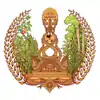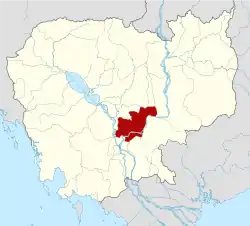Kampong Cham Province
Kampong Cham (Khmer: ខេត្តកំពង់ចាម, IPA: [kɑmpɔːŋ caːm], "Port of the Chams") is a province (khaet) of Cambodia located on the central lowlands of the Mekong River. It borders the provinces of Kampong Chhnang to the west, Kampong Thom and Kratié to the north, Tbong Khmum to the east, and Prey Veng and Kandal to the south. Kampong Cham was officially divided into two provinces on 31 December 2013 in what was seen by many as a political move by the ruling party.[2][3] All land west of the Mekong remained Kampong Cham while land east of the river became Tbong Khmum province. Prior to this division, Kampong Cham extended eastward to the international border with Vietnam, was the eleventh largest province in Cambodia, and with a population of 1,680,694, was the most populous province in Cambodia. Its capital and largest city is Kampong Cham.
Kampong Cham
ខេត្តកំពង់ចាម | |
|---|---|
| Kampong Cham Province | |
 .jpg.webp) .jpg.webp) _-_Outside_Kampong_Cham_-_Cambodia_(48354782867).jpg.webp) From top: Wat Nokor, Wat Dey Doh, Bos Knoar Hill, Phnom Srei | |
 Seal | |
 Map of Cambodia highlighting Kampong Cham | |
| Coordinates: 11°59′N 105°27′E | |
| Country | |
| Provincial status | 1 January 1885 |
| Capital | Kampong Cham Municipality |
| Government | |
| • Governor | Un Chanda (CPP) |
| • National Assembly | 10 / 125
|
| Area | |
| • Total | 4,549 km2 (1,756 sq mi) |
| Area rank | 18th |
| Population (2019)[1] | |
| • Total | |
| • Rank | 7th |
| • Density | 198/km2 (510/sq mi) |
| • Density rank | 5th |
| Time zone | UTC+07 |
| Dialing code | +855 |
| ISO 3166 code | KH-3 |
| Districts | 10 |
| Communes | 109 |
| Villages | 916 |
Etymology
Kampong Cham means "Port of the Chams" in Khmer. Kampong means port, harbor. Cham refers to the ethnic Cham people living in the province. The word Kampong in Cham is shared in other Austronesian language, the Malaysian and Indonesian, both mean village. A symbol the province is known for is two snakes wrapped around each other, which located at the capital city bridge, Kampong Cham.
Geography
.jpg.webp)
Kampong Cham is primarily lowlands. The main river is the Mekong River which forms the eastern border of the province, separating it from Tbong Khmum province.
Administration
Kampong Cham is subdivided into 9 districts and 1 municipality which in turn are subdivided into communes (khum) which are further divided into villages (phum).[4] The province formerly consisted of 16 districts, however a request by Hun Sen's government to split the province in two was made after his ruling Cambodian People's Party (CPP) lost the province to the opposition in the July 2013 elections.[3] The CPP won only eight of the available 18 National Assembly seats in Hun Sen's home province. The request, which was ostensibly made in order to improve administrative efficiency in the large province, was approved by King Sihamoni on 31 December 2013. The 10 districts that remain in Khampong Cham province overwhelmingly voted for the opposition Cambodia National Rescue Party, led by Sam Rainsy, while five of the six districts cut out from Kampong Cham to form Tbong Khmum Province were won solidly by the CPP.[2]
| ISO Code | District | Khmer |
|---|---|---|
| 03-01 | Batheay | ស្រុកបាធាយ |
| 03-02 | Chamkar Loeu | ស្រុកចំការលើ |
| 03-03 | Cheung Prey | ស្រុកជើងព្រៃ |
| 03-05 | Kampong Cham Municipality | ក្រុងកំពង់ចាម |
| 03-06 | Kampong Siem | ស្រុកកំពង់សៀម |
| 03-07 | Kang Meas | ស្រុកកងមាស |
| 03-08 | Koh Sotin | ស្រុកកោះសូទិន |
| 03-13 | Prey Chhor | ស្រុកព្រៃឈរ |
| 03-14 | Srey Santhor | ស្រុកស្រីសន្ធរ |
| 03-15 | Steung Trang | ស្រុកស្ទឹងត្រង់ |
Politics
Kampong Cham is allocated 10 seats in the National Assembly, down from 18. It had been the largest constituency until 2018.
Notable people
- Bun Rany, President of Cambodian Red Cross
- Hang Thun Hak, former Prime Minister
- Hem Heng, diplomat
- Heng Samrin, Speaker of the National Assembly
- Hun Manet, son of Hun Sen
- Hun Neang, father of Hun Sen
- Hun Sen, Prime Minister
- In Tam, former Prime Minister
- Keng Vannsak, author
- Kong Korm, Senator
- Say Chhum, President of the Senate
- Sim Var, former Prime Minister
See also
- Cham people
- Champa
- Kampong Cham, the capital of Kampong Cham province.
- Khmer people
References
- "General Population Census of the Kingdom of Cambodia 2019 – Final Results" (PDF). National Institute of Statistics. Ministry of Planning. 26 January 2021. Retrieved 3 February 2021.
- Mom, Kunthear; Kevin Ponniah (10 January 2014). "Kampong Cham's great divide". The Phnom Penh Post. Retrieved 29 January 2014.
- Phorn, Bopha; Alex Willemyns (10 January 2014). "Government Creates New CPP-Majority Province". The Cambodia Daily. Retrieved 29 January 2014.
- "Kampong Cham Administration". Royal Government of Cambodia. Archived from the original on 2009-02-10. Retrieved 2009-01-20.